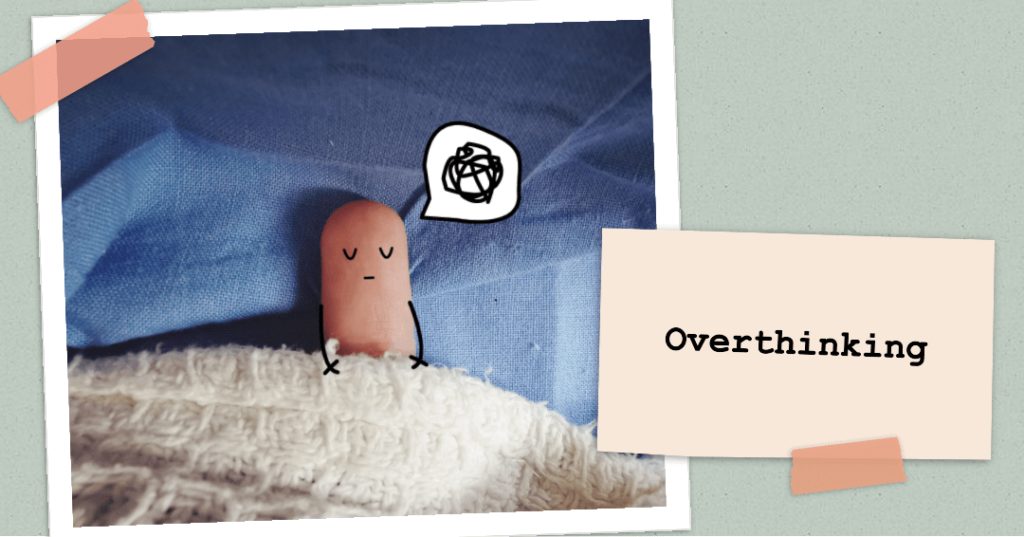Hey there, fellow overthinkers! If you’re reading this, chances are you’ve spent countless nights lying in bed, replaying conversations, and analyzing every decision you’ve ever made. Welcome to the overthinking club, where our brains never seem to take a break.
Overthinking is like a sneaky ninja that creeps into our minds, making simple decisions feel like solving a complex puzzle. In this blog post, we’ll dive deep into the world of overthinking, understand its roots, and explore practical ways to break free from its relentless grip. So, grab a comfy seat, and let’s go on this journey to conquer this together.

Blogger’s Note
Just like ‘The Art of Self-care‘, this is also a subscriber’s request. I want to note that i appreciate all your feedbacks and suggestions and I encourage you to keep them coming.
The Overthinking Phenomenon
What exactly is overthinking? It’s not just a passing thought or a momentary reflection. It is a full-blown mental marathon where your brain races through every possible scenario, consequence, and permutation of a situation. It’s the mental equivalent of going down a rabbit hole with no clear way out.

- The Causes of Overthinking
a. Perfectionism: Are you a self-proclaimed perfectionist? If so, welcome to the overthinking Olympics. Perfectionism often leads to overanalyzing every detail, fearing mistakes, and imagining worst-case scenarios. Spoiler alert: Nobody’s perfect, and that’s perfectly fine.
b. Fear of Failure: Overthinkers tend to have an intense fear of failure. The mere thought of making a wrong move can send our minds into overdrive. But what if we viewed failure as a stepping stone to success? Embracing failure is like giving overthinking a one-two punch.
c. Decision Fatigue: Ever heard of decision fatigue? It’s the idea that making too many decisions can exhaust our mental resources, leading to poor judgment and overthinking. So, when your brain feels like it’s running on empty, it’s more prone to entering the overthinking marathon. - Overthinking in Action
a. The Replay Button: Picture this: you just had a conversation with someone, and instead of moving on, your brain hits the replay button. You analyze every word and every facial expression, trying to decipher hidden meanings. Newsflash! Most people aren’t secretly plotting against you in their spare time.
b. Catastrophizing: Overthinkers are masters at catastrophizing. A minor hiccup becomes a catastrophic event in our minds. The ability to turn a molehill into a mountain is our not-so-super superpower.
c. Analysis Paralysis: Have you ever been stuck in a decision-making loop? The more options you have, the harder it is to choose. Analysis paralysis is like quicksand for overthinkers—the more you struggle, the deeper you sink. - The Toll on Mental Health
a. Anxiety and Stress: Overthinking is a close cousin of anxiety. The constant mental chatter and worry take a toll on our mental well-being, leading to increased stress levels.
b. Insomnia: Overactive minds don’t always come with an off switch. Overthinking, especially at night, can turn your peaceful sleep into a chaotic mess of restless tossing and turning.
c. Relationship Strain: Overthinking can seep into our relationships, creating unnecessary doubts, misunderstandings, and communication breakdowns. It’s time to break free from the overthinking cycle and nurture healthy connections.
Breaking Free from Overthinking
Now that we’ve dissected the beast that is overthinking, let’s explore practical strategies to break free from its clutches.

- Mindfulness and Meditation
a. Mindfulness Practices: Cultivate mindfulness through practices like meditation and deep breathing. These techniques help anchor your mind in the present moment, preventing it from wandering into an overthinking abyss.
b. Daily Check-Ins: Take a few moments each day to check in with yourself. Ask how you’re feeling and acknowledge any overthinking patterns. Awareness is the first step towards change. - Challenge Negative Thoughts
a. Reality Check: When your mind starts conjuring catastrophic scenarios, perform a reality check. Ask yourself if your thoughts are based on facts or mere assumptions. Spoiler alert! Most catastrophes exist only in our minds.
b. Positive Affirmations: Counteract negative thoughts with positive affirmations. Remind yourself of your strengths, achievements, and the fact that mistakes are a natural part of life’s journey. - Set Realistic Goals
a. Embrace Imperfection: Accept that perfection is an illusion. Set realistic goals and acknowledge that mistakes are opportunities to learn and grow. Progress, not perfection, should be the ultimate goal.
b. Break Tasks into Smaller Steps: Large tasks can be overwhelming for overthinkers. Break them into smaller, more manageable steps. This makes the process less intimidating and reduces the likelihood of overanalyzing. - Create a Decision-Making Framework
a. Establish Priorities: When faced with multiple choices, establish your priorities. Focus on what truly matters, and let go of the less significant decisions. Not every choice requires an extensive mental debate.
b. Time Limits: Set time limits for decision-making. Overthinking tends to thrive in an environment of limitless possibilities. By imposing time constraints, you force your brain to focus and make decisions more efficiently.
Conclusion
Overthinking is a universal experience, but it doesn’t have to be a permanent state of mind. By understanding its causes, recognizing its manifestations, and implementing practical strategies, we can break free from the overthinking cycle.
Remember, life is a journey filled with twists, turns, and unexpected detours. Embrace the uncertainty, celebrate the imperfections, and, most importantly, give your mind the freedom it deserves. It’s time to stop overthinking and start living. Here’s to a more mindful, balanced, and overthinking-free future!

I want to extend a heartfelt thank you for taking the time to read this blog post. I hope it was informative, insightful, and most importantly, useful to you. Mental health is an important topic that affects us all, and I’m grateful for the opportunity to share my thoughts with you.
If you have any thoughts or comments, I encourage you to leave them in the comment box below. Your feedback is essential to me and helps me create content that is tailored to your needs.
If you found this post helpful, please subscribe to my newsletter for more resources and updates on mental health. You can also reach out to me via email if you have any questions or just want to chat. Remember, taking care of your mental health is important, and you are not alone.
Leave a Reply